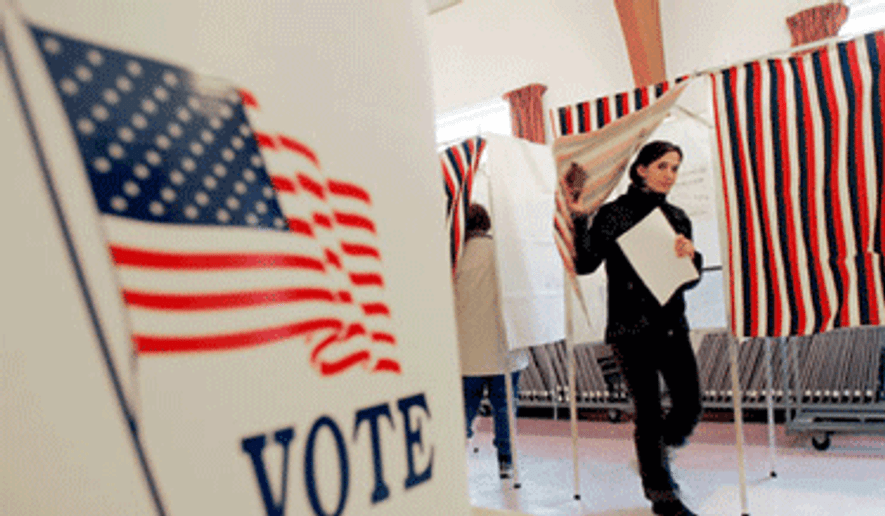The Public Interest Legal Foundation is warning nearly 250 counties that they could face a lawsuit over bloated voter rolls, after their own analysis released Monday found they have more people registered to vote than could theoretically be eligible.
New York City’s big counties are on the list, with New York County — also known as Manhattan — listing 54 percent more names on its voter rolls than the total number of people of voting age, according to Census Bureau figures.
The other boroughs also made this PILF list this year, as did San Diego in California.
All told, some 248 total counties spanning 24 states were getting warnings for having bloated voter rolls in the 2016 election, the PILF said. That’s up from 144 counties across 21 states warned after the 2014 election.
“Voter fraud begins with corrupted voter rolls,” said PILF President J. Christian Adams. “We hear about possible cyberattacks, but we aren’t doing enough to fix voter rolls that are certainly corrupt. The voter rolls are so bad in some states that election officials would have a hard time telling the difference between sabotage and negligence.”
Mr. Adams is a member of President Trump’s new voter integrity commission, which is likely to take a look at bloated voter rolls as part of its mandate.
Voters can remain on the rolls even after having died, left a jurisdiction or otherwise become ineligible to vote there.
Federal law urges rolls to be cleaned up, but makes the culling a tricky and legally challenges process.
The Supreme Court is slated to hear a case in its upcoming term over Ohio’s voter-culling practices, which lower courts ruled were too aggressive. Ohio puts voters on notice if they haven’t cast ballots in two years. If the voters fail to respond to the notice, and don’t vote in any of the subsequent four years, the state removes them.
The Obama Justice Department had opposed Ohio’s policy in the lower courts, but with the case now pending in the Supreme Court the Trump Justice Department is backing Ohio.
Voter groups have taken up the slack, filing a series of briefs urging the justices to reject Ohio’s policy.
“It is common sense that eligible voters have the right to choose when, how, and how often to vote. They shouldn’t be disenfranchised for exercising that right,” said Dale Ho, director of the American Civil Liberties Union’s Voting Rights Project.
Mr. Adams and the PILF, though, are hoping to pressure states from the other side, using part of federal law to threaten lawsuits over bloated rolls.
Under the law, the PILF must send a warning letter to the jurisdictions first. In a sample letter, the group it had compared Census Bureau data and the counties’ own voter data and found a mismatch.
“In short, your county has significantly more voters on the registration rolls than it has eligible, living, citizen voters,” the warning letter says, demanding a host of data from each offending jurisdiction.
The PILF has filed nine lawsuits over the last two years stemming from its previous bloated-rolls report.
Localities have challenged the use of census data, saying it doesn’t completely overlap actual eligible voters. College students, for example, can show up in census data in one jurisdiction, while being registered to vote elsewhere.
But counties such as New York, where the roles are 54 percent higher than the potential voter pool as identified by census data, would seem to be well outside a margin of error.
A request for comment from New York’s board of elections wasn’t returned.
The PILF said Kentucky has the most counties of any state with bloated rolls, with 41 jurisdictions on the list. The group said that’s “particularly concerning” because Kentucky’s secretary of state, Alison Lundergan Grimes, has been a fierce critic of Mr. Trump’s voter integrity commission, declining to share information.
Bradford Queen, a spokesman for Ms. Grimes, disputed the usefulness of census data for voting purposes, and said the PILF report was “a poor attempt to grab a negative unfounded headline.”
“Kentucky does not conduct the census and there are numerous reasons to doubt its precision in measuring population, especially in rural areas and small jurisdictions,” he said.
He said Kentucky has removed more than 350,000 voters from its rolls since 2011, in accordance with state and federal laws.
And he said Ms. Grimes will continue to resist the voter commission’s data requests.
• Stephen Dinan can be reached at sdinan@washingtontimes.com.




Please read our comment policy before commenting.